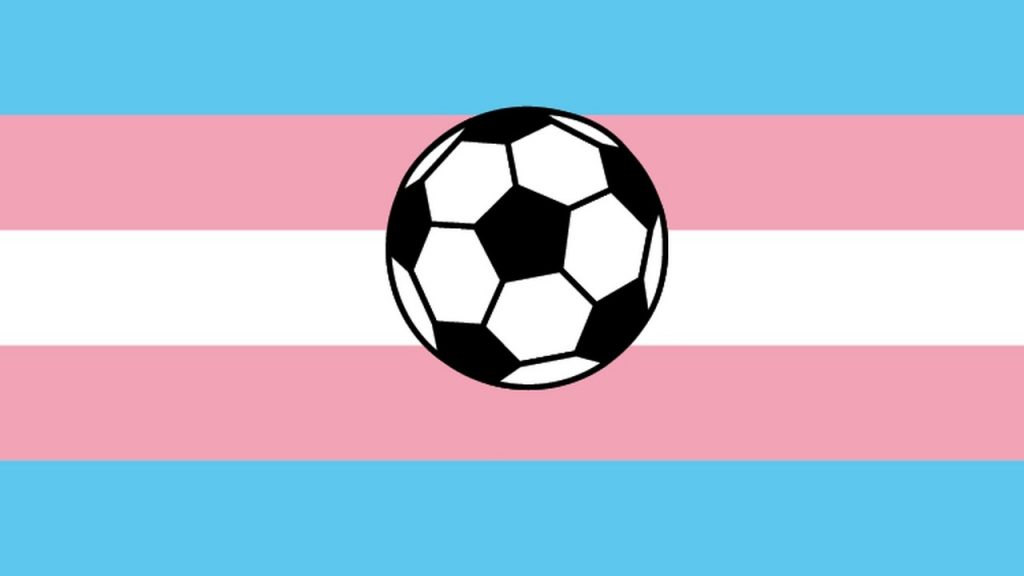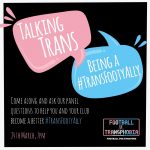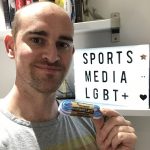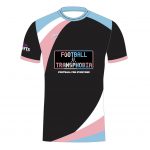The truth about being trans in football journalism
What’s it like to work in football media when you’re trans? Goal’s Emma Smith canvasses views from fellow writers who are trans and discusses her own experiences in support of the Football v Transphobia Week of Action…


Emma Smith is Assistant Editor and writer at Goal. She is also a member of our Sports Media LGBT+ network.
The football media industry in Britain has traditionally been dominated by one demographic.
Research undertaken by BCOMS for its 2018 D Word 3 Conference found that only three writers from the UK sports media working at the World Cup in Russia earlier that year were women. Across 63 roles assessed at the tournament, only one writer was black.
The representation of women and people from diverse ethnic communities is slowly improving, particularly with younger journalists breaking through. There is also now some LGBT+ visibility in football media – and within that, there is a small group of writers and editors who are transgender.

Whether working for well-known news organisations, emerging websites, or for blogs and newsletters with a dedicated online following, each of these journalists has established a voice for themselves and a readership in one of the world’s most competitive industries.
To mark the annual Football v Transphobia Week of Action, running from 24 to 31 March, I invited some of them to join me in talking about the game they love, their careers, and the allies who have stood by them…
Freedoms and frustrations – Grace Robertson

A freelance writer, Robertson is best known for her acclaimed blog and newsletter ‘Grace on Football’, which focuses on tactical and statistical analysis of the game.
She started off writing news articles for The Liverpool Offside, but things started to take off around the 2018 World Cup during her time at StatsBomb, giving her enough of an online profile to start her own newsletter.
Robertson says that while her focus is on creating a deeper understanding of the workings of football, she also wants to be an example for any other LGBT+ writers trying to make it in sports journalism. She is also conscious of the need to use her platform to call out bigotry when she sees it.
She says: “The biggest positive is the sense that trans people are finding and reading my work. A few years ago, it would have meant an awful lot to me for someone I read regularly to be trans, so hopefully I can be that for someone else.
“On a negative sense, there have been times when I’ve felt I’ve had to tow the party line and not call out transphobia where it exists as not to hurt others’ reputations. In fact, one of the main benefits to predominantly writing under my own banner now is the sense that I’m free to speak about trans rights as often as I want to.”
Robertson is very unhappy with the more traditional media’s attitudes towards trans people, particularly when it comes to sports, and says that allies have an important role to play in helping to provide balance and create space for more accurate reporting.
“Frustration would be an understatement,” she says. “The coverage, at best, could be described as viewing us as a problem to be solved rather than human beings with any kind of agency.
“Perhaps I’m part of the problem, as I have turned down one or two chances to talk about this, but I’ve almost never seen trans people invited to discuss the involvement of trans people in sport in the British media.
I think the most significant thing [allies can do] is show a willingness to listen to issues and amplify trans voices discussing the subject, rather than simply staying confined to the conversations of big established cis journalists.
“Our stories are ours to tell, and sometimes those looking to silence us hide behind notions of ‘neutrality’. Just taking some time to listen to what we have to say can help a lot.”

Robertson praises Mike Goodman, who she worked with at StatsBomb, as being a key ally in allowing her to get established in sports media.
Goodman, now with CBS Sports, says of working with her: “I obviously think the world of Grace, and consider her a friend.
“Years ago, I did reach out to her and ask her to pitch me ideas when I was managing editor at StatsBomb. I don’t view myself as having done anything particularly special in that regard.
“I knew her through Twitter, thought she was extremely talented, and her voice would be a great fit for the outlet, and she took the opportunity – and I was thrilled to see her absolutely excel pretty much immediately.”

EVENT – ‘TALKING TRANS’
Watch a replay of this special FvH Youth Panel event
Hosted by FvHYP’s Sam Clarke, with guests Sammy Walker, Samuel Bailey (Charlton Invicta FC), and Caz Fields (FC United Women)
Arsenal, awareness, and allyship – Lee Hurley

A sportswriter for more than 20 years, Hurley has appeared in The Guardian, Vice, The Mirror, Metro and more, and currently runs Arsenal news site Daily Cannon.
He began his career in journalism aged 21 – having been discouraged from pursuing it by his school as it was “too hard” – beginning at an architectural magazine before entering the world of football blogging 12 years ago.
A trans man, Hurley started his journalism career while presenting as female – and says that ingrained sexism in football culture made things a lot harder in the beginning.
He says: “I started before I transitioned and it was actually much tougher writing about football online as a gay woman. Since I transitioned, people don’t really give me a second look now, I just appear to them as another white guy alongside them, albeit shorter than most of the others.
“It allows me to open conversations I perhaps wouldn’t be able to otherwise and I’ve had a few people write to tell me that I’ve helped them change their views first on women in football, then gay people, and now trans people as I’m quite open about my journey.”
Hurley thinks trans people are “more or less invisible” to most football fans, journalists and editors, and that allies in the industry can play a massive role in promoting the subject as a topic for coverage.
“Awareness is a massive problem and anything that can be done to help raise it should be praised,” he says. “There are so many misleading and, let’s be honest, outright false stories about trans people in sport, particularly trans women, that we need to find a way to change that narrative. Hire trans people, look for different perspectives, challenge preconceived notions.
I wasn’t aware I was trans back then [as a youngster trying to break into the industry], but just the support to be myself would have helped open so many other doors for me. I’m sure it’s the same in sports journalism.
“When you have the confidence to be yourself, that shines through in the things that you write and the opportunities you are prepared to chase. Having someone support you through that is vital.”
Read our 21 Questions With… Q&A feature with Lee from July 2018.
Finding your voice, and being visible – Sammy Walker

A former Watford academy player, Walker came out as a trans woman in her mid-20s and is now awaiting her playing debut for a club in the English women’s third tier after a spell out injured.
During her lay-off, she has begun pursuing sports writing more seriously, with several pieces for fan blogs as well as discussing her own journey and experiences on her website – sammywalker.co.uk – and in other outlets.
She says: “My second choice of career behind actually playing was to be involved with football media. As lockdown started in 2019, and with an abundance of time on my hands to watch games, I decided to give it a go and take writing seriously. I applied to a few growing sports blogs to cover my team, West Ham, and eventually got a break.
“I think the biggest positive is realising just how many people are supportive of trans and non-binary people in the sporting world. It is so easy to get sucked into the negative rhetoric that dominates mainstream media regarding trans people. It does, however, make me more of a target for abuse.”
She says the response to her and her writing in the media and from audiences often depends on the publication, but that it is crucial for trans writers and journalists to stay as visible as possible…
I think I lacked role models who were openly part of the LGBT+ community growing up and I didn’t know of anyone in the sporting world, media-wise or professionally playing, who was trans.
Walker names Jon Holmes, who she met through playing for LGBT+ inclusive football club Soho FC and who is a Sky Sports editor and writer, as an ally in her journey.

Holmes says: “Sammy is not only a talented footballer but she’s also an excellent team-mate and I really admire how she’s become such a strong voice for the trans and non-binary community in the game.
“Visibility is so important, but Sammy appreciates more than most how it can bring challenges, particularly in sport. When we first met at Soho FC a few years ago, she was still navigating that for herself.
“I’ve learned a lot from interviews Sammy has granted since then to media in both the UK and the US, her own writing, and the panel discussions she’s taken part in – her honesty and self-confidence are inspiring, and I’m sure other trans people who love the game have felt empowered through discovering her story.
“Post-pandemic, I’m looking forward to seeing her back on the pitch where she belongs – and I’m sure that off-field, in the football media, she’ll remain one to watch as well.”
Read the Goal.com feature interview with Sammy, written by Emma Smith, from December 2020.
The effect of empathy – Emma Smith
I’ve been a professional journalist for five-and-a-half years, working for most of that time in sports for Mail Online, insidethegames, and Goal.
I’m now an assistant editor for the latter website, and I also write regular features including interviews with LGBT+ players and others involved in football.
For me, being able to tell stories that are so often overlooked as niche or unappealing by other publications is a major plus.
Sometimes in football, and by extension football media, it can seem as if any coverage opposing homophobia, transphobia or other forms of bigotry has to be confined to certain times of the year and can be completely ignored otherwise.

It’s important to show there is a permanent place for LGBT+ people, both in the game of football and in the mainstream media which covers it.
What I’m concerned about is the lack of willingness to provide accuracy and balance from some news organisations, particularly concerning trans people participating in sport.
The framing of the debate – which is such a toxic word in itself, as so many anti-trans people do not want a discussion of any kind – is that any man will be able to claim he is a woman and just walk into a female sports team.
This is utterly untrue. The FA and other sports governing bodies have strict rules and guidelines around when trans people can participate, particularly regarding hormonal levels.
There is an atmosphere of fear and prejudice being created around people who just want to play football, or rugby or cricket or whatever, and it is going to end badly.
Coverage would be improved by telling the stories of individual athletes chasing success, rather than claiming that faceless individuals are supposedly trying to erase sport as we know it.
It is so much easier to sympathise and identify with a person when you know their name and story. It makes for much better, more personal journalism too – stories about individuals are always more engaging than endless tales of bans, protocols, and so-called protective measures.

Responsible for helping me cover trans people in football is Peter Staunton, Goal‘s head of news and features.
He regards fuller coverage of LGBT+ people and issues in sport is part of a necessary widening of the media’s scope, which he thinks has been too narrow and focused on a privileged few.
He says: “There are too many barriers into journalism for young people. It is by and large an elitist sector. I think it’s hard for people to break in unless they have gone to the right schools and universities, but I consider journalism to be a trade that anyone can learn when they are young.
“By the time people go to the right sixth forms and universities, they have by and large been influenced to adopt a certain outlook or worldview. That’s no bad thing for individuals in the main but it leads to a monopoly on opinion and viewpoints in the biggest and most important sites and papers. If everyone comes from the same background, how can journalism possibly reflect what’s out there in society?
“From an LGBT+ perspective, I think certain outlooks within the journalistic community need to change – it can be as simple as beginning to commission stories and talk to the community.
“If you’re writing ‘about’ people instead of ‘with’ people, then it’s easier to ‘other’ them and continue to write or speak about them as if they’re a homogenous blob. That’s not the case. Every person has their own feelings, viewpoints, thoughts and opinions, just like any columnist.
“One side point – I also think writers who are transgender shouldn’t be pigeonholed into just writing about trans topics either, as if outlets have a trans writer on staff just for the sake of it. It shouldn’t be a sideshow. True inclusivity makes space for trans perspectives but then does not discriminate in terms of the kinds of stories journalists cover.”
Staunton feels that having a staff writer at Goal who is trans has ensured certain stories and perspectives have been covered that they would not have even considered otherwise.
He says: “I can’t control what goes on in other outlets but I would say I have had a few eyebrow-raising moments in terms of the kinds and quality of stories on trans people and topics I’ve read elsewhere.
“The pieces that Emma has pitched and submitted have been stunning portraits of sports participants who are trans. I think the coverage could be improved by telling more stories with individual participants. Sport should be inclusive.”
Further reading…
Transphobia in sport: Misconceptions and the media
‘Talk to us – and listen’: A blog for Trans Awareness Week
If you’re trans or non-binary and interested in learning more about football media, Emma and the team at Sports Media LGBT+ can offer useful information and advice. Contact us, in confidence, to start a conversation.
We also welcome correspondence with allies working in the industry who want to learn how to make their workplaces more LGBT+-inclusive.
Show your support for Football v Transphobia – the Week of Action begins on Wednesday, March 24, and runs through to Trans Day of Visibility on the 31st. Find out more here.
Sports Media LGBT+ is a network, advocacy, and consultancy group that is helping to build a community of LGBT+ people and allies in sport. We’re also a digital publisher. Learn more about us here.
LGBT+ in sports? Your story could help to inspire other people – you don’t have to be famous to make an impact, and there are significant gains to be made for you personally and more widely in sport. Start a conversation with us, and we’ll give you the best advice on navigating this part of your journey.
Email jon@sportsmedialgbt.com or you can send a message anonymously on our Curious Cat.


